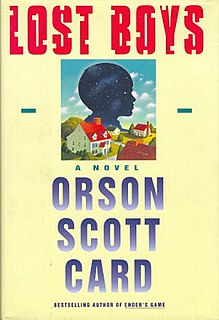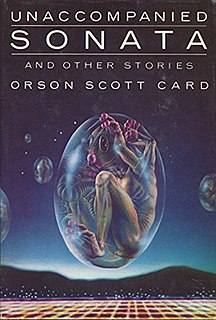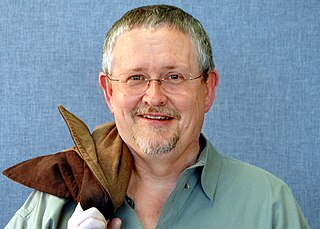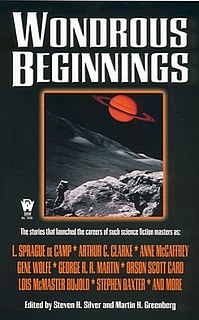
Ender's Game is a 1985 military science fiction novel by American author Orson Scott Card. Set at an unspecified date in Earth's future, the novel presents an imperiled humankind after two conflicts with the Formics, an insectoid alien species they dub the "buggers". In preparation for an anticipated third invasion, children, including the novel's protagonist, Andrew "Ender" Wiggin, are trained from a very young age by putting them through increasingly difficult games, including some in zero gravity, where Ender's tactical genius is revealed.

Lost Boys (1992) is a horror novel by American author Orson Scott Card. The premise of the novel revolves around the daily lives of a Mormon family, and the challenges they face after a move to North Carolina. The story primarily follows the family's troubles at work, church, and the oldest child Stevie's difficulty fitting in at school, which lead to him becoming increasingly withdrawn.
The Ender's Game series is a series of science fiction books written by American author Orson Scott Card. The series started with the 1977 short story Ender's Game, which was later expanded into the 1985 novel of the same name. It currently consists of 15 novels, thirteen short stories, 47 comic issues, an audio play, and a film. The first two novels in the series, Ender's Game and Speaker for the Dead, each won both the Hugo and Nebula Awards, and were among the most influential novels of the 1980s.

Maps in a Mirror (1990) is a collection of short stories by American writer Orson Scott Card. Like Card's novels, most of the stories have a science fiction or fantasy theme. Some of the stories, such as "Ender's Game", "Lost Boys", and "Mikal's Songbird" were later expanded into novels. Each of the smaller volumes that make up the larger collection as a whole are centered on a theme or genre. For instance, Volume 1, The Changed Man, reprints several of Card's horror stories. The collection won the Locus Award in 1991.

Lovelock is a 1994 science fiction novel by Orson Scott Card and Kathryn H. Kidd. The novel's eponymous narrator takes his name from James Lovelock, the scientist-inventor who formulated the Gaia Hypothesis, which figures heavily in the book.

Ender in Exile is a science fiction novel by American writer Orson Scott Card, part of the Ender's Game series, published on November 11, 2008. It takes place between the two award-winning novels: Ender's Game and Speaker for the Dead. It could also be considered a parallel novel to the first three sequels in the Shadow Saga, since the entirety of this trilogy takes place in the span of Ender in Exile. The novel concludes a dangling story line of the Shadow Saga, while it makes several references to events that take place during the Shadow Saga. From yet another perspective, the novel expands the last chapter of the original novel Ender's Game. On the one hand, it fills the gap right before the last chapter, and on the other hand, it fills the gap between the last chapter and the original (first) sequel. Ender in Exile begins one year after Ender has won the bugger war, and begins with the short story "Ender's Homecoming" from Card's webzine Intergalactic Medicine Show. Other short stories that were published elsewhere are included as chapters of the novel.

Unaccompanied Sonata and Other Stories (1980) is a collection of short stories by American writer Orson Scott Card. Although not purely science fiction and definitely not hard science fiction, the book contains stories that have a futuristic angle or are purely works of fantasy set in current times. All the stories except “The Porcelain Salamander” were first published elsewhere before appearing in the Unaccompanied Sonata collection. All eleven of these stories were later published in Maps in a Mirror.

Orson Scott Card is an American writer known best for his science fiction works. His novel Ender's Game (1985) and its sequel Speaker for the Dead (1986) won both the Hugo Award and the Nebula Award. A feature film adaptation of Ender's Game, which Card co-produced, was released in 2013. Card also wrote the Locus Fantasy Award-winning series The Tales of Alvin Maker (1987–2003).
This is a list of the works of Orson Scott Card. This list does not include criticisms, reviews, or related material written by Card. Orson Scott Card is the author of The Ender's Game and Homecoming Saga among many other works.

Wastelands: Stories of the Apocalypse is an anthology of post-apocalyptic fiction published by Night Shade Books in January 2008, edited by John Joseph Adams.
"A Thousand Deaths" is a short story by American writer Orson Scott Card. It appears in his short story collections Capitol and Maps in a Mirror. Card first published it in the December 1978 issue of Omni magazine.
"In the Doghouse" is a science fiction short story by American writers Orson Scott Card and Jay A. Parry. It appears in his short story collection Maps in a Mirror. Card originally published this story in the December 1978 issue of Analog Science Fiction and Fact.
"Lifeloop" is a science fiction short story by American writer Orson Scott Card. It appears in his short story collections Capitol and The Worthing Saga. Card first published it in the October 1978 issue of Analog Science Fiction and Fact.
"Skipping Stones" is a short story by Orson Scott Card. It first appeared in his short story collection Capitol and then later in The Worthing Saga.
"America" is a science fiction short story by American writer Orson Scott Card, originally published in the January 1987 issue of Asimov's Science Fiction magazine. It was reprinted in Card's short story collection The Folk of the Fringe.
"Ender's Game" is a science fiction short story by American writer Orson Scott Card. It first appeared in the August 1977 issue of Analog magazine and was later expanded into the 1985 novel Ender's Game. Although the foundation of the Ender's Game series, the short story is not properly part of the Ender's Game universe, as there are many discrepancies in continuity.
Ender's Game is a series of comic book adaptations of a series science fiction novels of the same name written by Orson Scott Card and published by Marvel Comics that began in October 2008. However, some have new content, not released before in novel format. The series, like the novels they are based on, are set in a future where mankind is facing annihilation by an aggressive alien society, an insect-like race known colloquially as "Buggers" but more formally as "Formics". The central character, Andrew "Ender" Wiggin, is one of the child soldiers trained at Battle School to be the future leaders of the protection of Earth. The year is never specified, although the ages of the Wiggin children are specified to change throughout space, taking in the relativity of space and time.

Wondrous Beginnings is an anthology of science fiction short stories edited by Steven H. Silver and Martin H. Greenberg, first published in paperback by DAW Books in January 2003. It is a compilation of the first published stories of seventeen prominent authors in the genre, and features introductions to the stories provided by the authors of those stories. Wondrous Beginnings was the first of three similarly-themed anthologies, its companions being Magical Beginnings and Horrible Beginnings, compiling the first published stories of authors writing in the fantasy and horror genres, respectively. The book follows the example of the earlier First Flight: Maiden Voyages in Space and Time, edited by Damon Knight and First Voyages, edited by Damon Knight, Martin H. Greenberg and Joseph D. Olander. which did not include individual introductions. The content of Wondrous Beginnings has little overlap in content with these earlier anthologies, however, as only the stories by de Camp, Clement and Clarke are repeated from them.

The Hive is a 2019 science fiction novel by Orson Scott Card and Aaron Johnston, and the second book of the Second Formic Wars trilogy of novels in the Ender's Game series. It was released on June 11, 2019.









